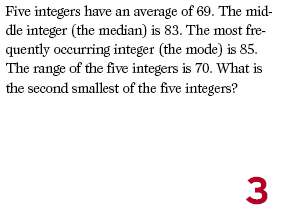1.
|
'
An iterative average of the numbers 1, 2, 3, 4, and 5 is computed the following way. Arrange the five numbers in some order. Find the mean of the first two numbers, then find the mean of that with the third number, then the mean of that with the fourth number, and finally the mean of that with the fifth number. What is the difference between the largest and smallest possible values that can be obtained using this procedure?

' |
|
2.
|
'
The median of the list
 is is  . What is the mean? . What is the mean?

' |
|
3.
|
'
The mean, median, unique mode, and range of a collection of eight integers are all equal to 8. The largest integer that can be an element of this collection is

' |
|
4.
|
'
The mean of a set of five different positive integers is 15. The median is 18. The maximum possible value of the largest of these five integers is

' |
|
|
|
|
7.
|

|
|
|
9.
|
'
An iterative average of the numbers 1, 2, 3, 4, and 5 is computed the following way. Arrange the five numbers in some order. Find the mean of the first two numbers, then find the mean of that with the third number, then the mean of that with the fourth number, and finally the mean of that with the fifth number. What is the difference between the largest and smallest possible values that can be obtained using this procedure?

' |
|